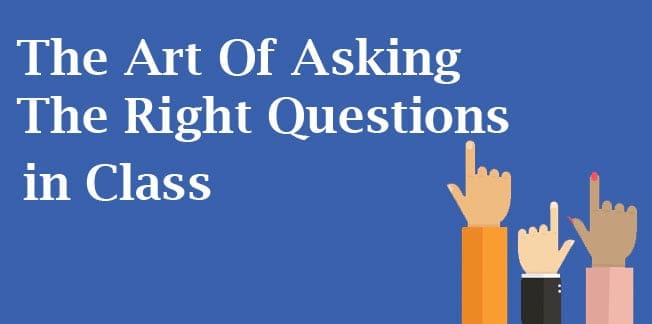
The Art Of Asking The Right Questions in Class
When I first started my EMBA, I was shy, nervous and frightened of saying and doing the wrong things. I was scared of failing. And because I was surrounded by so many high-achievers, I was scared of doing something stupid and embarrassing.
For this reason, it was a few weeks until I asked my first question in class. And the only reason I asked a question was because my professor prompted me.
“Come on. I want questions from someone different today,” he said sternly. I knew one of us silent types had to speak out. I knew it should be me. After all, here I was, wanting to be a future leader or entrepreneur, and yet I couldn’t even ask a question in class.
I remember how I felt at that moment. My knees buckled, I had butterflies in my stomach and my heart started to race violently. I had always wanted to ask a question, but I had always been afraid. I didn’t know how to frame my questions, and I worried they’d be silly.
Instead, I had watched the confident students raise their hands and ask their well-thought-out questions.
But now my professor had opened the door for the rest of us. It was my chance. I knew I had to take it. As I raised my hand, I felt the spotlight fall on me. I was actually sweating. The professor cast his gaze around the class, until finally it settled on me.
“Yes?” he asked.
My lips quivering, my heart about to explode from my chest, I asked my question. The professor nodded thoughtfully as I – in my head at least – ranted incoherently. But he understood, paused for a moment to reflect on what I had asked, and answered.
I had done it. I had asked a question. There was a smattering of acknowledgement from other students, some of whom jotted down the professor’s answer in their notebooks. From then on, I had the confidence to ask more questions.
If you’re in the same position I was for far too long, here are a few tips to help you ask the right questions.
Listen To How Others Phrase Their Questions
Just like writers read other writers’ prose to get better at writing, you should pay special attention to how your fellow students phrase their questions in class. You will notice that there are a variety of different ways of structuring a good question, as well as lots of phrases that make a question either good or bad.
I listened carefully to the way my peers asked questions before I asked my own. One thing I noticed is that it’s pointless to ask why and more productive to ask how.
For example, instead of inviting a long, rambling and pointless answer about why something is the way it is, ask how it can be improved. This is much more productive.
The more you listen to the way others ask their questions, the better yours will become.
Ask For Clarity
Asking questions is in an MBA class for the first ever time is a nerve-racking experience. So why not relieve some of the pressure by asking clarifying questions?
What I mean by this is that you ask the professor to explain a point he made – even if you understand it.
Asking for clarification on something is risk-free and eases you into the process of asking questions, exposing yourself to the experience without any kind of pressure.
Note Down Some Potential Questions
Noting down potential questions not only arms you with potential questions for different occasions, but it also lets you see whether or not someone else has thought of the same one.
For example, let’s say you’re sitting in a lecture and have made a note of a potential question. You don’t actually intend to ask it because you’re a little bit nervous and don’t want to risk looking silly. You just want to practice creating questions.
Then, a classmate asks the exact same question that’s on your sheet of paper. You now know at least one person had the same question in mind as you, which should give you the confidence to keep creating questions until eventually you raise your hand.
Learn To Reduce Anxiety And Build Your Confidence
You’re going to find it hard to ask a question if you’re missing confidence. There are a few ways you can build your self-esteem in class. You could, for example, improve your posture, sit close to the front so that you’re more involved, and note down exactly what you want to say before repeating it in your head until you’re invited to speak.
Some programs, such as IMD keep class sizes small (90 participants) to foster an environment where there is a lot of mutual support, “In such a close knit community we encourage participants to help one another – by applying what you learn and getting continuous feedback of the whole community around you, we believe you gain the confidence to act.” So, if you find yourself in this type of small, intimate environment, take advantage of the opportunity and hone your questioning skills!
Follow-Up
The first time I asked a question in my EMBA class I followed it up with a “thank you”. I was annoyed at myself because I wasn’t satisfied with the answer my professor ha given me. I wanted more.
If your question hasn’t been fully answered, it’s totally okay to ask for further clarification. Take baby steps and slowly build yourself up to the point where you feel comfortable asking questions in any environment.
This guest post is written by guest blogger Gretchen Shaw. Gretchen is an author, blogger and entrepreneur with a penchant for baking. She is passionate about communication, continued learning and connecting people. You can follow her on Twitter: @shawgret






